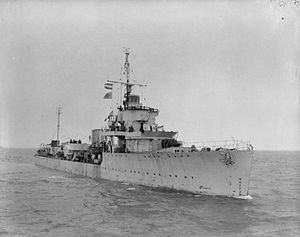HMS Vanquisher (D54)

|
|
| History | |
|---|---|
|
|
|
| Name: | HMS Vanquisher |
| Namesake: | |
| Operator: | Royal Navy |
| Ordered: | 30 June 1916 |
| Builder: | John Brown & Company, Clydebank, Scotland |
| Laid down: | 27 September 1916 |
| Launched: | 18 or 28 August 1917 |
| Commissioned: | 2 October 1917 |
| Decommissioned: | June 1945 |
| Identification: | Pennant number: D54 |
| Motto: | Pugna vinco pugno ("I fight, I conquer with my fist") |
| Honours and awards: |
|
| Fate: |
|
| Badge: | A gold dexter arm with clenched fist on a white field |
| General characteristics | |
| Class and type: | Admiralty V-class destroyer |
| Displacement: | 1,272-1,339 tons |
| Length: | 300 ft (91.4 m) o/a, 312 ft (95.1 m) p/p |
| Beam: | 26 ft 9 in (8.2 m) |
| Draught: | 9 ft (2.7 m) standard, 11 ft 3 in (3.4 m) deep |
| Propulsion: |
|
| Speed: | 34 kt |
| Range: | 320-370 tons oil, 3,500 nmi at 15 kt, 900 nmi at 32 kt |
| Complement: | 110 |
| Armament: |
|
HMS Vanquisher (D54) was a V-class destroyer of the British Royal Navy that saw service in World War I and World War II.
Vanquisher, the first Royal Navy ship of the name, was ordered on 30 June 1916 as part of the 9th Order of the 1916-17 Naval Programme. She was laid down on 27 September 1916 by John Brown & Company at Clydesbank, Scotland, and fitted to carry 60 naval mines by order of the British Admiralty on 12 January 1917. She was launched on 18 or 28 August 1917 (sources vary) and was commissioned on 2 October 1917.
Upon completion, V- and W-class destroyers, including Vanquisher, were assigned to the Grand Fleet or Harwich ForceVanquisher saw service in the last year of World War I.
On 1 August 1918, Vanquisher was operating as part of the 20th Destroyer Flotilla when the flotilla departed the Humber estuary to lay a minefield in the North Sea at the outer end of one of the German-swept channels through the German minefield in the Heligoland Bight. At 23:47 hours the force was within 20 nautical miles (37 km) of the area it was to mine when the destroyer Vehement struck a mine. Its explosion caused Vehement's forward ammunition magazine to detonate, blowing off the entire forward section of the ship forward of the forward funnel, killing one officer and 47 ratings. As the force manoeuvered to clear the minefield it had entered, the destroyer Ariel also struck a mine at 00:10 hours on 2 August and, in a repeat of what had happened to Vehement, suffered a magazine detonation that blew off the entire section of the ship forward of the whaleboat's davit. Ariel sank at about 01:00 hours on 2 August, with the loss of four officers and 45 ratings, but Vehement remained afloat, and by about an hour after she struck the mine her crew had put out all of her fires. She was taken in tow by the destroyer Abdiel in the hope of saving her, but at 04:00 hours on 2 August Vehement's stern rose into the air, making further towing impossible. Vehement's surviving crew opened all of her hull valves to speed her sinking and abandoned ship, and Vanquisher and the destroyer Telemachus then sank Vehement with gunfire.
...
Wikipedia
